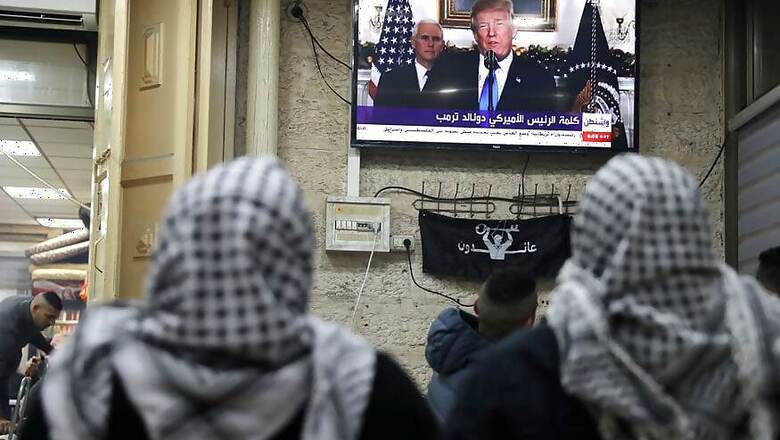
views
New Delhi: India has reacted to US President Donald Trump’s announcement recognising Jerusalem as Israel’s capital. Raveesh Kumar, spokesperson for the Ministry of External Affairs said, “India’s position on Palestine is independent and consistent. It is shaped by our views and interests and not determined by any third country.”
But some analysts believe that the message was not categorical enough.
They said that since India’s relations with and support for Palestine dates back to even before its own independence, hence it was important for New Delhi to send out a clear and unambiguous message in support of Palestine’s sovereignty.
Others believe India is treading a fine line and in that context the statement was measured as it ought to be.
Former secretary in the Ministry of External Affairs, Rajiv Sikri told CNN-News18 that Trump’s decision “was part of his pro-Israel policy to remove hesitation that some other countries would have in recognizing Jerusalem as Israel’s capital. But through its statement India has made it clear that it won’t follow suit, at least not immediately”.
Sikri points out that even though on paper India has not acknowledged Jerusalem as Israel’s capital but through its move it has “ implicitly implied” so. The fact that PM Narendra Modi in the first visit ever by an India Prime Minister to Israel held meetings with President Reuven Rivlin and Benjamin Netanyahu in Jerusalem and not Tel Aviv is a pointer to that direction.
There have also been several high level visits from India to Israel since 2014, by Home Minister Rajnath, External Affairs Minister Sushma Swaraj and President Pranab Mukherjee indicating the growing bonhomie between the two sides which have only this year marked the 25 years of diplomatic relations.
But in September this year, during an intervention in the NAM Ministerial Meeting on Palestine, Swaraj said, “For independent India, support for the Palestinian cause has been a reference point of its foreign policy.” She had said that India’s commitment to the Palestinian cause and its solidarity with the Palestinians can never be undermined.
Swaraj categorically spelt out what India sees as a possible solution – “The path to this clearly lies in an early negotiated solution between Israel and Palestine based on mutual recognition and security arrangements.”
Similarly, earlier this year when Palestinian President Mahmoud Abbas visited India, Prime Minister Modi said, “We hope to see the realization of a sovereign, independent, united and viable Palestine, co-existing peacefully with Israel.” He also said that he discussed extensively “the situation in West Asia and the Middle East Peace Process.” It is this Peace Process that many feel risks being derailed by Trump’s announcement.
Will India go any further in spelling out where does it see the Middle East Peace Process heading now? There was no mention in the Indian statement on whether New Delhi sees an independent Palestine with East Jerusalem as its capital as a viable solution. India has firmly been on the Palestinian side for a long time though. India was also one of the first countries to recognize the State of Palestine in 1988. Before that, India became the first Non-Arab State in 1974 to recognize the Palestine Liberation Organization (PLO) as the sole and legitimate representative of the Palestinian people. And so, perhaps Palestine’s expectations from India might be a little more in view of the current development.




















Comments
0 comment